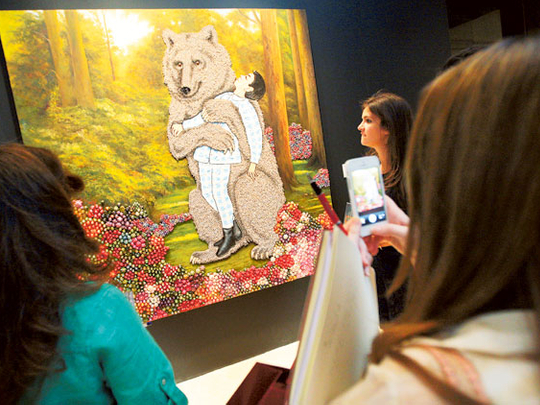
Dubai: Christie’s, a leading auction house, is set to have a strong season this year in Dubai as the Middle East’s art market sees steady and sustainable growth.
“The Arab market has recovered from its lows, and its back on an upward curve,” said Michael Jeha, managing director of Christie’s in Dubai.
This year marks Christie’s seventh twice-yearly auction. The first auction of the season, which has two parts, will run from Tuesday to Wednesday. It will feature modern and contemporary works by Middle Eastern artists hailing from Lebanon, Iran, Syria, Egypt, Morocco and Turkey.
The first part, on Tuesday, will have roughly 30 lots, with price estimates starting from $50,000 (Dh183,500). It will feature Farhad Moshiri’s 2009 piece Sectet Garden, estimated between $300,000-$500,000 — the highest at this month’s auction. The Iranian artist’s work is expected to sell more than its estimate. Moshiri’s One World sold for $601,000, over ten times its estimate, in 2007.
The second part of the auction, on Wednesday, will have works starting from $3,000. Since its introduction in 2011, the second part of the sale has attracted many young artists and collectors.
“It’s important to help engage a younger and wider audience. Often there’s a misconception that art is only for the super rich — that’s not the case,” Jeha said. The second part of the sale will have around 95 lots.
Initiatives
Additionally, the second part of the sale “brings Dubai in line with [Christie’s] international sales centres in London, New York and Hong Kong. It’s a sign of a maturing market here,” he said.
The Dubai art market has matured in the past five to six years. Since 2006, when Christie’s had their first auction season, until today, the Middle East market has grown at an incredible rate, attracting many participants. There are more galleries and art initiatives in the region now. Paris’ Louvre, a fine arts museum, is expected to open its doors in Abu Dhabi in 2015.
Jeha credits this rise to the increase in “awareness and appetite” for art in the region. Christie’s, a London-based company with offices around the world, achieved their strongest sales record in Dubai between 2007 and 2008, according to Jeha. Despite the financial woes of 2008, collectors still bought art works.
“A loyal buyer will still buy [despite the recession],” said Hala Khayat, head of sales and associate director at Christie’s in Dubai.
“Art is an asset — it has value. It can be passed on to your children and they can sell it,” Khayat added.
However, in 2007 and 2008 , whilst these were Christie’s best years, the art market then in the Middle East and elsewhere was “over-heated” and “wasn’t sustainable,” Jeha said. But since 2009, the market has recovered steadily and there has been more sustainable growth, compared to the previous two years, he said.
Traditional collectors
“In 2007 and 2008, there were so many speculators in the market. Once the financial crises hit, they were pretty much rinsed out of the market and exited, and so you saw traditional collectors return. You still saw art as an investment, but it’s different-it’s not to the extent of the speculations of 2007 and 2008 when it was really on a different level. So you have more traditional collectors now. People are much more measured — they ask a lot more questions about works before they acquire them, which are all signs of a maturing market,” Jeha said.
Meanwhile, the Dubai market has reeled in more international participants, which is important for its long term sustainability, according to Jeha. “Around 30 to 40 per cent of auctions in Dubai are sold to international collectors.”
Additionally, since the financial crisis, the Iranian market has been taking longer to recover compared to the Arab market, although it is “off its lows”. Jeha added that this could be due to the political unrest in the country.
“In the next five to ten years, I’d like to see more corporate collections and more education at the grass roots,” Jeha said.
Sarah Algethami is a trainee at Gulf News












